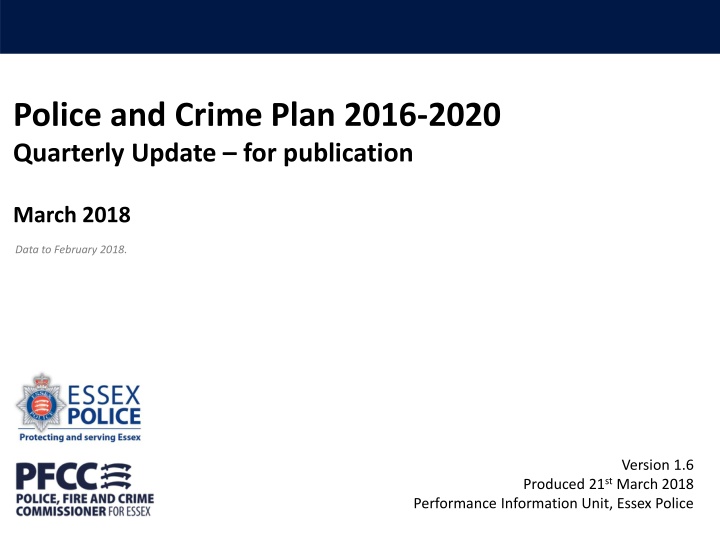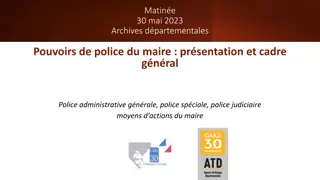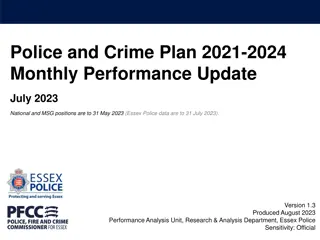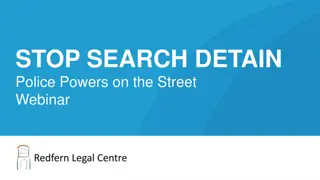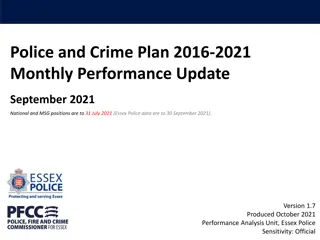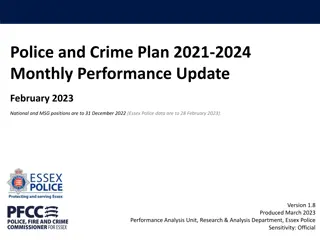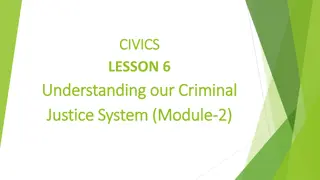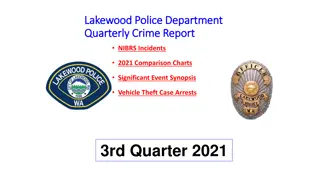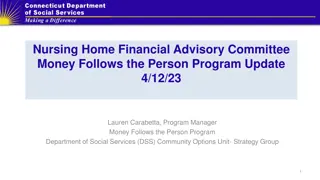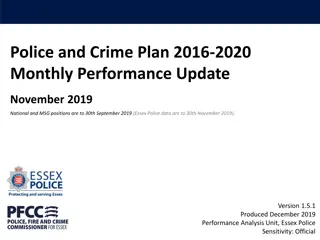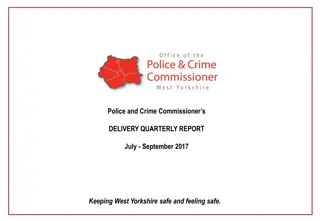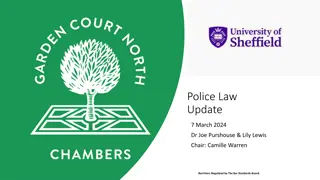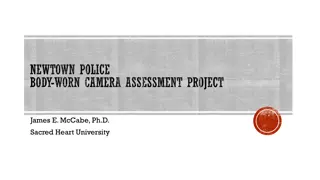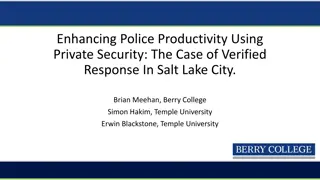Essex Police Quarterly Update March 2018: Priorities and Progress
The Essex Police and Crime Plan 2016-2020 Quarterly Update for March 2018 highlights various priorities including boosting community volunteering, tackling anti-social behavior, and enhancing visible policing. Efforts to increase the Special Constabulary, engage Active Citizens, and improve public accessibility to police services are detailed. Initiatives such as recruitment drives and volunteer engagement events have shown positive results, contributing to enhanced policing services and community safety. The report also notes improvements in contact methods with the police, emphasizing responsiveness and efficiency.
Download Presentation

Please find below an Image/Link to download the presentation.
The content on the website is provided AS IS for your information and personal use only. It may not be sold, licensed, or shared on other websites without obtaining consent from the author.If you encounter any issues during the download, it is possible that the publisher has removed the file from their server.
You are allowed to download the files provided on this website for personal or commercial use, subject to the condition that they are used lawfully. All files are the property of their respective owners.
The content on the website is provided AS IS for your information and personal use only. It may not be sold, licensed, or shared on other websites without obtaining consent from the author.
E N D
Presentation Transcript
Police and Crime Plan 2016-2020 Quarterly Update for publication March 2018 Data to February 2018. Version 1.6 Produced 21st March 2018 Performance Information Unit, Essex Police
Police and Crime Plan 2016-2020 Quarterly Update March 2018 Contents Priority 1 More Local, Visible and Accessible Policing 3-5 Priority 2 Crack Down on Anti-social Behaviour 6 Priority 3 Breaking the Cycle of Domestic Abuse 7-8 Priority 4 Reverse the Trend in Serious Violence 9-10 Priority 5 Tackle Gangs and Organised Crime 11-12 Priority 6 Protecting Children and Vulnerable People 13-14 Priority 7 Improve Safety on our Roads 15 2
Police and Crime Plan 2016-2020 Quarterly Update March 2018 Priority 1 - More Local, Visible and Accessible Policing We will: Boost community volunteering, encourage the Active Citizen Programme and grow the police family doubling the Special Constabulary, with a Special Constable in every community. Essex currently has 123 Active Citizens. Active Citizens in Chelmsford and Maldon District supported a nationally promoted week of action relating to knife crime awareness. Two further applicants to the Active Citizen initiative in the District were received in late February. The Special Constable headcount increased from 332 in May 2017 (the start of the #MyOtherLife campaign) to 416 at the end of February 2018 (84 additional officers); a further 18 officers are scheduled to start in March 2018. In the last quarter there have been 262 applications to join the Special Constabulary; 110 candidates are currently in pre-employment checks. Proactive media will increase through March 2018, culminating in a volunteer recruitment fun day at Essex Police HQ on 24th March; this will be supported by Heart FM. In the three months to 28th February 2018, Special Constables provided 31,205 hours of service; this is an increase of 12% when compared to the same period in 2016, when Special Constables provided 27,823 hours of service. There was also a 13% increase in the numbers of hours spent on operational duties (those where officers are most likely to be visible to the public) compared to the same period in 2016: 21,731 to 19,290 hours. This is equivalent to an additional 59 full-time officers ( 776k salary equivalent over a quarter). Special Constables recorded 11,154 hours of visible policing in the three months to 28th February 2018 (this equates to an average of 124 hours per day). Colchester Special Constabulary have introduced a rolling monthly itinerary for community event engagements and Specials deployments in Colchester. This is shared across the District in advance. The Special Constabulary in Chelmsford and Maldon District achieved over 800 hours work in the review period. This included policing events, the night-time economy and drug throw-overs to HMP Chelmsford. 3
Police and Crime Plan 2016-2020 Quarterly Update March 2018 Priority 1 - More Local, Visible and Accessible Policing We will: Make it easy to contact the police through Do It Online and improvements to 101 ensuring that the public get a swift and responsive service from the police. 101 calls have decreased slightly over the past quarter (-4.8%) compared to the same period in 2016-17. Abandoned calls to 101 have continued to reduce, with February recording the lowest level in a year (12.2%). Abandoned calls to Crime Bureau are at 16.8%, the third lowest month in the last year; there has been a continued downward trend over the past 7 months. In June 2017 average call waiting times for 101 were around 6-7 minutes; they are now 2-3 minutes. The average time for a 101 call to be answered by the Switchboard is decreasing. Year to date is 6 seconds; in February 2018 it was 4 seconds. Current work is ongoing to tackle repeat callers and streamline processes with other agencies who generate high demand. Process changes within Contact Management include shortened calls protocol (leading to reduction in abandoned rates) and additional training to equip staff to deliver more services at first point of contact (direct crime recording, recording intelligence reports). The Quality of Service Team are about to trial Live Chat within Essex Police. This is being planned to expand to include FCR and 101 calls, and will be achieved through reductions in radio talk groups as a consequence of mobile device improvements and officers using self-service. Crime Bureau call wait times have reduced from 28/29 minutes in June 2017 to 9/10 minutes over the last quarter. A significant factor has been the introduction of mobile devices and direct input for officers not equipped with these devices. Online reporting remains stable. Between December 2017 and February 2018, there were 7,457 reports made online around lost and found/ASB/crime/RTCs and intelligence reports; these would previously have been reported via 101 or front counter based reports. For the previous 12 months, over 27,800 reports have been made online to Essex Police. The project work by i3 and KPMG is now reaching design stage and early indications are that Essex can make some significant efficiency savings by updating our demand/resource profiles and introducing more ways for the public to report incidents and crimes; these will provide a faster response to victims whilst continuing to meet Home Office rules on recording standards. This work is scheduled for completion in early April, with a rollout to follow once the final design is agreed by Chief Officers. 4
Police and Crime Plan 2016-2020 Quarterly Update March 2018 Priority 1 - More Local, Visible and Accessible Policing We will: Support increased participation in Neighbourhood Watch, Street Pastors, Active Citizens and Volunteer Police Cadets. There are currently 300 Volunteer Police Cadets in the county. Further recruitment took place in January and February with over 40 applications currently being processed. A full time Volunteer Cadet Co-ordinator was appointed on 8th January 2018. The objective of this role is to ensure the growth of the Volunteer Police Cadets, with a longer term vision of looking at a Junior Volunteer Cadet Programme for those aged between 10-13 years; this will be addressed with a five year Plan. Street Pastors have applied for PFCC Community Safety Development Fund funding to secure their coordinator role. If successful the Street Pastor will expand services to create a Rail Pastor to work on the rail links into the county. During February, Colchester Police and Partnerships delivered the second Street-Weeks in the selected area of New Town Ward. Street- Weeks takes a front-foot approach to Community engagement with face-to-face local contact, bespoke events and organised partner 360 degree participation. The engagements are carried out by a vast spectrum of partners and police from Volunteer Police Cadets, Neighbourhood Watch and Active Citizens through to specialist Road Policing Units, local Councillors, MP and the District Commander. The activities span 24 hours each day, and aim to deliver against the previous scoping of local issues of people in that area. Chelmsford and Maldon District have conducted initial work to commence Coffee with a Cop , which will take place at locations identified with ASB/nuisance youth issues. Active Citizens have been requested to support these deployments. Townlink group is being developed in Chelmsford and Maldon District to reduce reliance on Police and focus on use of technology (e.g. FaceWatch) and other initiatives to permit greater communication and self-help between city centre businesses and groups. Pubwatch in Maldon and South Woodham Ferrers is also being developed by the District Police Licensing Officer. Active Citizens have worked with local officers on Spot It Stop It Initiative (CSE training and awareness), Operation HENDERSON (CSE awareness on rail networks) and Knife Crime Awareness Week. Active Citizens have also assisted local officers following Operation POTTERY (Witham attempted rape). 5 A new group of Volunteer Police Cadets has just started in Basildon.
Police and Crime Plan 2016-2020 Quarterly Update March 2018 Priority 2 Crack Down on Anti-social Behaviour Working with partners we will: Target repeat and high harm anti-social behaviour to protect individuals and communities from distress and disruption. West LPA have recruited to fill the vacant ASB Officer post. Chelmsford community policing team have been working in partnership with Chelmsford City Council via Operation STATUE to manage the repeat harm caused by aggressive begging in the town centre. This sees support services given to those who are homeless or need welfare interventions but continue to harass members of the public; they are issued with enforcement notices using legislation under the Anti-Social Behaviour, Crime and Policing Act 2014. Colchester have introduced a specific Crime and Harm Reduction Plan, focusing on anti-social behaviour and night-time economy policing. Driven through the Community Safety Hub, specific ownership of key areas have been identified and partner action is being supported through Safer Colchester Operations Group. Chelmsford and Maldon Community Policing Team are leading a partnership approach to address anti-social behaviour in the Springfield area. Action includes: mobile police station deployments; attendance at local Neighbourhood Watch meetings; review of offences under investigation. This has resulted in the identification of two suspects, one of whom was reported, and another charged. Shared information with District Partners (Braintree District Council, Uttlesford District Council and Housing associations) has led to a number of drug warrants being executed in Braintree and Saffron Walden. Individuals have been arrested and drugs found; a Closure Notice was also served on a property. Operation HARWICH was set up in response to increased reporting of anti-social behaviour and lower-level crime in Harwich, and was run by the Community Safety Hub. Through information-sharing and joint deployments, six Anti-social Behaviour Contracts and two Community Warnings for young people were issued. The operation also achieved the eviction of a prolific family, with the support of Housing. Joint enforcement teams have been developed in Southend with partners, and includes joint patrols. Project Neighbourhood involves engagement with developing community on Canvey Island with regards the reporting of anti-social behaviour issues. 6
Police and Crime Plan 2016-2020 Quarterly Update March 2018 Priority 3 Breaking the Cycle of Domestic Abuse (DA) Working with and through the Domestic Abuse Strategic Board to deliver an ambitious programme of transformation we will: Support victims and their families affected by domestic abuse to feel safe, cope and recover through targeted help and jointly commissioned services; and tackle offending behaviour through robust behaviour change programmes to break the cycle of domestic abuse. A Christmas Campaign was organised to provide an intense approach around Domestic Violence Protection Notices (DVPN) and Domestic Violence Protection Orders (DVPO). The objectives of this campaign were to: increase the quantity of cases considered for DVPN issue; improve the quality of DVPN/O applications; provide additional policing/monitoring of the DVPN/O s with a view to identifying and arresting for any breach offences; provide an enhanced level of service and support to domestic abuse victims. The initiative operated between 11th December 2017 18th January 2018 to incorporate National Divorce Day on 8th January. During the Campaign there was an 81% increase in the number of DVPN applications compared to the same period on the previous year. There was also an 80% increase in arrests due to perpetrators breaching the orders. A engagement forum was held at the Women s refuge in Colchester during December 2017 in order that can the police could listen to victims concerns and experiences. Development of a specific bespoke questionnaire relating to victims of Domestic Violence is underway to help understand and shape the policing service provided and enhance a route-map of all available support, education and diversion avenues to break the cycle of domestic abuse. Whilst initial safeguarding will be completed by the attending officer, investigators and the Central Referral Unit will raise at risk families and relationships at the Community Hub meetings to ensure that all partner agencies are aware of the concerns/risk around individuals. Braintree and Uttlesford District Councils have also been raising awareness of the Ask Angela campaign, which has further been promoted through Pub Watch. Project 360 in South LPA involved key workers being embedded in Juno teams in order to engage with medium risk domestic abuse victims within 24 hours to provide safeguarding, assess victims risk and refer them to DA support agencies. Southend and Basildon Community Hubs now have Referral Officers as part of the Community Policing Team to ensure effective referral to partnership organisations. 7
Police and Crime Plan 2016-2020 Quarterly Update March 2018 - continued Priority 3 Breaking the Cycle of Domestic Abuse (DA) Working with and through the Domestic Abuse Strategic Board to deliver an ambitious programme of transformation we will: Support victims and their families affected by domestic abuse to feel safe, cope and recover through targeted help and jointly commissioned services; and tackle offending behaviour through robust behaviour change programmes to break the cycle of domestic abuse. South LPA is currently trialling Project 360, a secondary-responder programme in which engagement workers, with an expertise in assisting victims of domestic violence, work from within the police force. Following a reported medium risk domestic incident, the engagement worker contacts the victims via telephone within 24 hours and acts as a mediator between the police and local domestic violence support services. This project commenced on the 4th December 2017. It is envisaged that the introduction of the engagement worker will enhance the care and safeguarding of the victims of DA after initial police attendance, and in the vital period between charge and court hearings. Training has been delivered to NHS safeguarding champions in order to assist them in identifying honour based abuse (HBA) victims and also those victims who may be vulnerable to forced marriage and female genital mutilation. This training has provided the Safeguarding Champions with the knowledge needed to undertake this role, including high risk factors involved, how police safeguard victims, police HBA investigations and the referral pathways that partner agencies can use. A Perpetrator Leaflet is being produced. These will be given to offenders when they are issued with a Domestic Violence Protection Notice (DVPN) and will provide the details of available advice and support to encourage them to understand how their behaviour affects their partner and children, as well as the services that can assist them in changing/stopping their behaviour. This leaflet will also provide details of the newly introduced relevant Violence Against Women and Girls (VAWG) Perpetrator Pathway services. There has been a review of the use of Demand Cars for police attendance at domestic abuse incidents. The Demand Car will attend incidents at the direction of Force Control Room (FCR); Controllers will manage these units and ensure results are promptly provided and previous diary arrangements have stopped. There has further been a strengthening around the attendance times and review process when an incident has not been attended; appointments will now only be used by FCR staff for DA within the policy guidance. 8
Police and Crime Plan 2016-2020 Quarterly Update March 2018 Priority 4 Reverse the Trend in Serious Violence Working with partners we will: Bring violent offenders to justice through targeted police enforcement, working closely with neighbouring forces such as the Metropolitan Police. Operation CORNWALL was an investigation into the murder of Gary BASSETT. In January 2018 Lloyd DEACON was found guilty of manslaughter. He was sentenced to 9 years imprisonment. Operation MALLOW was an investigation into the murder of Margaret SIMS (aged 70 years) who was suffocated with a pillow by her daughter, Keeley BARNARD. In February 2018, BARNARD was found guilty of murder and was sentenced to life imprisonment; she is to serve a minimum of 18 years. The Fusion briefing and tasking concept was introduced to Colchester mid-October 2017. This concept makes best use of all available resources in the District to locate and arrest outstanding violent offenders. Bringing all teams (including wider commands such as the Roads Policing Unit and Operational Support Group) together for a daily 10 minute dynamic briefing has seen the increase in intelligence-sharing and joined-up working; it is chaired by the District Commander or Detective Chief Inspector. Since its inception over 70 outstanding prolific offenders have been successfully located and arrested (December 2017, 20. January 2018, 25). The reach of Fusion now extends to contact establishments within the Metropolitan Police area, where cross border and transient criminals share a common offending route. Operation DRIVE was introduced in February 2018 to identify (through intelligence) the subjects causing the greatest level of harm, and against whom there are opportunities to enforce/disrupt. The latest example is a Harwich Domestic Abuse perpetrator, who is committing road traffic offences; the plan is to use the traffic matters to disrupt and establish as much control of the subject as possible. This individual has also been referred to the Problem Solving Group with partners. 9
Police and Crime Plan 2016-2020 Quarterly Update March 2018 Priority 4 Reverse the Trend in Serious Violence Working with partners we will: Ensure victims of rape and sexual violence receive the help and support they need, and work with criminal justice partners to ensure that perpetrators are convicted. Joint training with CPS lawyers took place in February as part of the rape improvement plan. Further training continues, with a Detective Inspector development day due on 1st March. Essex Police are attending a Metropolitan Police Conference in March in relation to the issued around disclosure in rape trials. Essex Police have had success with innovative telecommunication data that is supporting an upcoming serious sexual assault trial. Essex Police are working with partners and other forces in relation to engagement with sex workers, and have already seen offences being reported to us through the third sector. Essex Police are now involved in the creation of national policy towards dealing with crime against sex workers. A Sexual Assault Referral Centre (SARC) procedure has been introduced to enhance the management of those individuals who have been sexually assaulted. This protocol supports good practice and the development of the SARC service, to ensure the expectations of clients, staff and other partner agencies are met. The protocol defines services available at the SARC, provides guidance for police on the acceptance of referrals to the centre, and outlines details of the forensic, medical management of and support and care available to clients at the SARC. Information-sharing has been enhanced by establishing single points of contact within Criminal Justice Units and with partners. This promotes best practice and the focus on victim care (help and support referrals), as well as achieving best evidence. This has been circulated amongst Colchester Local Policing Teams and Community Policing Teams, and includes Early Evidence Kit considerations when dealing with or responding to a live sexual offence investigation to maximise first contact considerations, officer awareness and efficiency in our partnership service response. 10
Police and Crime Plan 2016-2020 Quarterly Update March 2018 Priority 5 Tackle Gangs and Organised Crime Working with partners we will: Support victims of human trafficking and modern slavery including sexual exploitation working closely with UK Border Agency (UKBA), National Crime Agency (NCA) and national and regional partners to bring perpetrators to justice Operation AIDANT, which seeks to extend and develop the information held on various communities (including those not previously recognised by police and partners), is now in its second year. As of May 2018, it will be carried out bimonthly, and will focus on key areas of exploitation, including sexual exploitation. Essex Police have invited guest speakers to a continuous professional development event on the 26th March to present to frontline practitioners including external agencies. Essex Police is identified as delivering best practice for victim engagement in other languages, awareness-raising campaigns, and training and victim safeguarding in the Collaborating for freedom: anti-slavery partnerships in the UK report from the Office of the Independent Anti- Slavery Commissioner and the University of Nottingham s Rights Lab. Essex Police also features as delivering best practice in the Thinking Outside the Box: Developing Multi-agency and Multidisciplinary Partnerships to tackle Modern Slavery in England report that was completed as part of the European Review of Organised Crime. Essex Police have been invited to the Netherlands to present on the partnership model, as well as engage with the National Police by sharing best practice in a number of areas such as Police and the non-governmental organisation (NGO) sector, victim support and training. A formal agreement is now in place between Essex Police and Medaille Trust offering victims identified in Essex a safe place to be taken to for up to five days. The studio apartment is for the sole use of Essex Police and it offers the victim(s) 24/7 staff support, psychological support, medical support, family support, legal support, food and toiletries. This agreement will be in place until January 2019. 11
Police and Crime Plan 2016-2020 Quarterly Update March 2018 Priority 5 Tackle Gangs and Organised Crime Working with partners we will: Disrupt and prevent organised drug distribution through improved intelligence shared between the police, partners and local communities to limit the harm drugs cause. In 2017, Essex police seized 346,820 of cash, 684,530 of drugs and 149 weapons, and arrested 668 people Status Number Number of Organised Crime Groups in Essex as of 28th February 2018: Active Archived Total 42 64 106 Number of Organised Crime Group disruptions in Essex as of 28th February 2018: Status Major Moderate Minor Negative None Total Dec-17 Jan-18 Feb-18 Total 0 2 8 0 0 0 1 3 0 0 4 0 0 5 0 3 8 0 3 16 0 3 10 22 Increase in intelligence submissions in North LPA from 429 in December 2017 to 726 in January 2018. Street-Weeks and District Engagement Plans enable the LPA to direct resources to known and frequented drug misuse locations. This has seen an increase in the number of drug warrants executed across the District. One example was suspected drug dealing in Williams Walk, Colchester; a gang member was arrested, class A and B drugs and a four figure sum of cash was seized. Operation SCEPTRE (Week of Knife Crime Action 12th 18th February 2018) resulted in the arrest of 17 people. Officers, Special Constables, the Operational Support Group, Operation Raptor teams, and volunteers from Neighbour Watch and Active Citizens, as well as Trading Standards, were all part of the operational activity. 27 weapons sweeps were conducted, and 183 knives were recovered or handed in during the week s operation. A total of 27 retail premises were visited, and police cadets assisted officers by helping to educate retailers about the importance of challenging underage customers, and selling knives and bladed objects within the law. There were 63 engagement events held across the county, including events with charity partner Only Cowards Carry and Local Policing Teams. The Chelmsford & Maldon Community Policing Team acted on intelligence to execute a warrant in January for Organised Crime Group (OCG) activity. This resulted in two large storage containers being identified; 80 plants and a large amount of cash being seized; one person was arrested at the scene. 12
Police and Crime Plan 2016-2020 Quarterly Update March 2018 Priority 6 Protecting Children and Vulnerable People Working with safeguarding partners and the Southend, Thurrock and Essex Safeguarding Boards we will: Bring more perpetrators of rape and sexual abuse to justice. Essex Police have begun tier two training for all detective sergeants to enable them to better monitor and assess the quality of suspect and victim interviews. Essex Police have set up a Multi-Agency Safeguarding Hub (MASH) with Southend Social Care and Health to enable fast-time sharing and assessment of intelligence, with a view to the earlier identification of risk (including child sexual abuse). Essex Police have aligned the minimum standards for the continuous professional development of sexual offence-trained officers to include recommended national standards. In March 2018, five officers (from all ranks) are undertaking an in-depth scoping visit to Derbyshire Constabulary, a high performing force within Essex s most similar group of forces. 13
Police and Crime Plan 2016-2020 Quarterly Update March 2018 Priority 6 Protecting Children and Vulnerable People Working with safeguarding partners and the Southend, Thurrock and Essex Safeguarding Boards we will: Improve reporting of hate incidents through improved community engagement and greater use of Hate Incident Reporting Centres. Hate Incident Reporting Centres (HIRCs) continue to be rolled out across Essex with further networks being established in Colchester and Clacton in the North of the county in 2018. The HIRC project has also increased its establishment of Hate Crime Ambassadors (HCAs) to over 450, with representatives present from the protected characteristics of Race, Religion, Sexual Orientation, Transgender and Disability. Essex Police held a Hate Crime event on the 8th February 2018 with guest speakers; managers and supervisors from a number of commands were in attendance. The event covered a variety of aspects of hate crime, including victim care, multi-agency collaboration, and working with the Crown Prosecution Service (CPS) to improve the outcome of investigations. Essex Police has commissioned Anglia Ruskin University to complete an in-depth study on disability hate crime, and is due for completion in June 2018. This will enable the force to gain a greater understanding of the experiences of this community in Essex, and the impact on their lives. The force will use the recommendations to improve the response to disability hate crime and to inform future policy and procedure. Colchester s Independent Advisory Group (IAG) reinvigoration programme was completed 9th February in conjunction with independent charity Community 360 CEO, Tracy Rudling, and all its members. Hate crimes are now being investigated by the Community Policing Team (CPT) in Braintree and Uttlesford. CPT Sergeants make contact with all victims of hate crime, provide support and reassurance, make referrals to support agencies where necessary, and agree a contract with the victim regarding contact in order to comply with the enhanced level of service. Presentation to Chelmsford City Council Overview and Scrutiny Panel in early February included a brief on the development of HIRCs in the area in order that panel members have greater understanding of the process and can promote reporting. The Tendring District Commander has instigated a review of the local Independent Advisory Group (IAG), resulting in a revised location and format. Command team members will be visiting Kingston, South-West London to observe a successful IAG and consider adopting best practice. The district continues to engage with various community groups through tasking and on a rolling basis, and this has proven effective with Vietnamese and Eastern European groups. 14
Police and Crime Plan 2016-2020 Quarterly Update March 2018 Priority 7 Improve Safety on our Roads Working with Safer Essex Roads Partnership we will: Reduce the numbers of people killed or seriously injured on our roads through the work of the multi-agency Safer Essex Roads Partnership on enforcement, engagement and education. 38 fewer killed and seriously injured (KSI) road traffic collisions (RTCs) to the same period last year (876 KSI casualties 2017/18 v 914 KSI casualties 2016/17.* However, in the last quarter there has been an increase in the number of serious injuries (226 serious casualties 2017/18 v. 189 serious casualties 2016/17). Colchester, Loughton, Basildon, Stanford le-Hope and Clacton have been identified as areas with the highest concentration of KSI collisions over the reporting period. This intelligence allows Essex Police and their Road Safety partners to direct pro-active road safety enforcement and education into these priority areas. The five routes highlighted below have seen increases over the past 3 months: Last 2 months Increase on Vulnerable road Route Peak Times collisions 5 year average users B1009 4 150% 60% P2W Weekend evenings A104 4 100% <10% - B1393 4 54% 11% Pedestrian 1600-1900 B183 4 43% 25% cycles - 25% cycles A138 4 33% 25% children Saturday daytime 25% P2W In December, The Safer Essex Roads Partnership launched the Extra Eyes road safety campaign. Essex Police has since reviewed 226 driving incidents with supporting digital images (Dash Cam, CCTV) resulting in 104 investigations that will lead to positive outcomes (Court, Conditional offer, educational course), 19 warning letters and 6 intelligence submissions. Drink and Drug driving remains a concern to The Partnership and a programme of engagement and educational activity is to be introduced by the Safer Essex Roads Partnership Communications manager to support the current proactive policing focus on this area of harm. During the reporting period Essex Police has arrested 306 drivers for drink driving compared to 279 over the same period 2016/17, and 202 drug drivers compared to 172 for 2016/17. Proactivity in tackling drug driving includes wider roll out of drug-testing kits and more trained officers to identify greater numbers of drug drivers. 15 * Please note that this data was re-run, and may therefore differ from that stated in previous reports.
